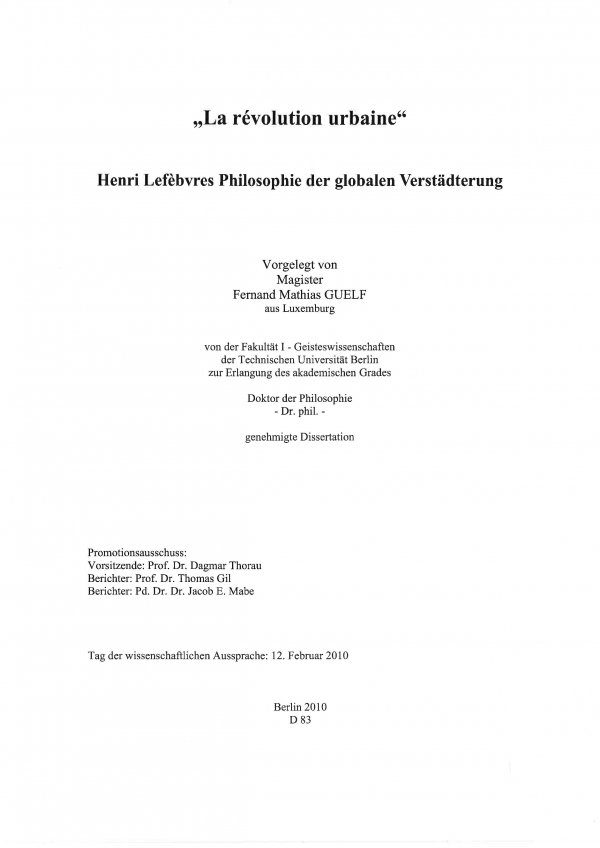La révolution urbaine. Henri Lefebvres Philosophie der globalen Verstädterung https://doi.org/10.14279/depositonce-2383
Exposé
Exposé
Die These einer globalen Urbanisierung beansprucht bei Lefèbvre eine umfassende geistige Konfrontation, die im Übergang von ruralen zu urbanen Strukturen zentrale Elemente von gesellschaftspolitischer und philosophischer Relevanz aufzeigt. Von der konkreten politischen Situation im Paris der sechziger Jahre ausgehend, entfaltet sich Lefèbvres provokative These von der Auseinandersetzung mit der „Praxis“ als Kritik des Alltags („critique de la vie quotidienne“) über entwicklungstheoretische Fragestellungen und Konzepte bis hin zu ästhetischen Debatten um zentrale Probleme des Urbanismus‘. Unterschiedlichste Aspekte werden schrittweise in ein umfassendes Konzept eingebunden. Einerseits die praxisorientierte Ausrichtung der These der globalen Verstädterung, die am politischen und gesellschaftlichen Alltag dokumentiert wird, andererseits die philosophische Dimension, die Schaffung einer zweiten Natur, der urbanen, ausgehend von der ursprünglichen, der ruralen als Entfaltungsprozess des Menschen. Beiden Lesarten, die sich zum Teil ergänzen, zum Teil schwer in ein schlüssiges Konzept einzubinden sind, wird in der Arbeit Rechnung getragen. Die philosophische Ausrichtung wird anhand der Bezüge zum praktischen und theoretischen Umfeld sowie der Einbindung in das Gesamtwerk progressiv erarbeitet. Die Arbeit am Original, allein schon durch die zum Teil irreführenden Übersetzungen und die Sperrigkeit einiger Textpassagen unumgänglich, steht für die Intention einer Wiedergabe und einer Interpretation aus erster Hand. Die Schwierigkeiten und Herausforderungen einer möglichst umfassenden Darstellung bestehen in der Tatsache, dass Lefèbvres Texte zur Stadt auf unterschiedlichen Ebenen zu lesen sind. Methodisch begegnet die Arbeit der These der globalen Verstädterung mit einer Darstellung von „La révolution urbaine“, um darauf aufbauend, zentrale Elemente und Aspekte erneut aufzugreifen und weiterzuentwickeln. Im Laufe der Arbeit ergibt sich eine zunehmende Verdichtung, die es erlaubt, die These der globalen Verstädterung als Kernaussage der Philosophie Lefèbvres ‚fugenartig’ darzustellen und zu deuten. Die Stadt als „oeuvre“ und die globale Urbanisierung als „oeuvre total“ zu bestimmen, erlaubt die „strategische Hypothese“ der globalen Verstädterung über jede soziologische Dimension hinaus im „praxisphilosophischen“ Zusammenhang zu deuten und Lefèbvre in philosophischen Kontext zu setzen. Der Bezug zur Gegenwart ergibt sich durch eine selektive Bestandsaufnahme, sowie den Versuch die These der Urbansierung zu aktualisieren.
Exposé
With Lefèbvre the theory of global urbanization requires a comprehensive intellectual confrontation, which manifests central elements of sociopolitical and philosophical relevance in the transition from rural to urban structures. Taking the concrete political situation in Paris in the sixties as a starting point, Lefèbvre’s provocative thesis that the examination of ”praxis“ is a critique of everyday life (”critique de la vie quotidienne“) develops from questions and concepts of evolution theory, leading on to aesthetical debates concerning central problems of urbanism. Widely differing aspects are integrated step by step into a comprehensive concept. On the one hand the practical orientation of the theory of global urbanization, documented by political and social everyday life, on the other hand the philosophical dimension, the creation of a second, urban nature, originating from the rural, as a process of human development. Both versions, partly complementary, partly difficult to integrate into a conclusive concept, are taken into account in the dissertation. The philosophical alignment is elaborated progressively by means of references to the practical and theoretical context and by integration into the complete works. The use of the original text, unavoidable due to some misleading translations and the unwieldiness of several passages, stands for the intention of a firsthand representation and interpretation. The difficulties and challenges in providing as comprehensive a portrayal as possible lie in the fact that Lefèbvre’s writings about the city can be read on different levels. Methodologically, the dissertation responds to the theory of global urbanization with a portrayal of ”La révolution urbaine“, as a base from which to take up central elements and aspects anew and develop them further. In the course of the dissertation a gradual consolidation takes place, which allows the theory of global urbanization to be portrayed and interpreted ”fugally” as the central statement of Lefèbvre’s philosophy. Defining the city as ”oeuvre“ and global urbanization as ”oeuvre total“ allows the ”strategic hypothesis“ of global urbanization to be interpreted within the context of the philosophy of praxis, above and beyond any sociological dimension, and Lefèbvre to be placed in a philosophical context. The relation to the present day results from a selective evaluation and from the attempt to update the theory of urbanization.
